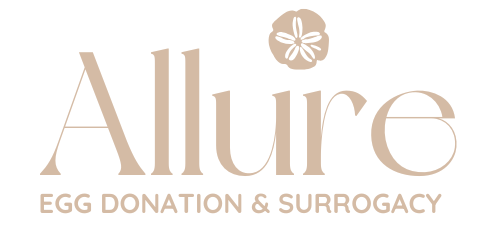

Allure Fertility
Santa Barbara, CA
Frequently Asked Question for Egg Donors at Allure Fertility
How long does this process take?
The egg donation cycle is approximately 6 weeks from beginning to end. However, the selection process to become an egg donor is rigorous and can sometimes take several months.
Will I need to miss school or work?
Once the donation process begins, you will attend about six clinic visits over a two-week period. Most of the appointments are scheduled for early in the morning so as to cause as little disruption to the donor's schedule as possible. The retrieval day will require the donor to take the entire day off, however most donors are able to return to school or work the following day. Because the procedures and tests involved in egg donation are time-sensitive, it is important that the egg donor recognizes the importance of making and keeping appointments.
How much compensation do egg donors receive?
Egg donors receive compensation for their time, generosity, and commitment. Those possessing exceptional attributes or higher education qualifications may receive increased compensation for their contribution as egg donors.
As an egg donor, the prospective parent assumes responsibility for covering all expenses associated with the egg donation process. This includes:
- Medical costs
- Egg donor insurance
- Compensation for the egg donor
- Legal fees
- Travel expenses
For egg donors who need to travel, compensation is provided to cover:
- Airfare for the egg donor and a companion
- Shared hotel accommodations
- Compensation for ground transportation
- Up to $100 per day for incidental expenses.
Does egg donation cost me anything?
No, there are no costs to the donor! The intended parents are responsible for all egg donor costs that occur as a result of an egg donation cycle, including egg donor compensation, donor medical costs, travel expenses, insurance fees, and attorney/legal fees.
Can I donate eggs if I'm on birth control?
Yes, you can be an egg donor if you are using birth control pills or other contraceptives like Nuvaring or an IUD. However, we cannot accept egg donors that are currently using Depo-Provera injections or Nexplanon contraceptive implants.
Can I donate eggs if my tubes are tied?
Yes, you can still donate your eggs if you have had your tubes tied, since tubal ligation only affects your fallopian tubes, not your ovaries or your egg production ability.
What medications do I have to take?
A doctor will determine what medications will be given. Over the course of approximately 2 weeks, an egg donor will self-inject three different medications. The first will stimulate the ovary to increase the number of eggs that mature in a single cycle. The second will prevent ovulation. The third hormone medication will be given to mature the eggs and induce ovulation.
Is it painful to be an egg donor?
Most egg donors share that the process is not painful, per se, but that you may experience some discomfort similar to menstrual cramps (over the counter medications usually take care of this!). The actual egg retrieval process takes place under sedation. A nurse will go over how to self-administer the injections at home, and the needle is so small that most donors do not report significant discomfort.
Does donating my eggs affect my fertility?
No. Donating eggs doesn’t significantly reduce the number of eggs you have left. People have been donating their eggs for over 20 years, and research shows they are just as likely to be fertile as people who never donated eggs. The average woman in her 20s has hundreds of thousands of viable eggs -- the retrieval process simply takes advantage of the eggs that are not used during the month.
Do I have to give myself injections?
Yes. The needles are small and easy to use. You should be comfortable with needles if you apply to be an egg donor.
How many times can I donate?
The recommended number of times a woman can donate her eggs is 6 times.
It can be an incredibly meaningful and impactful feeling to have successfully helped someone to grow their family, so it's understandable that some donors wish to make another donation.
So what are the limitations of donating eggs? And where does the number 6 come from?
The American Society of Reproductive Medicine (ASRM), the leading nonprofit multidisciplinary organization dedicated to the advancement of the science and practice of reproductive medicine, has recommend limiting the successful number of donations from a single donor to no more than 25 families per population of 800,000. This recommendation was made in an effort to limit concerns regarding too many blood-related children (avoiding the possibility of sibling marriage) from different families in one geographic location. The best way to do this will be more reliant on the number of donation cycles than anything else, hence the recommendation of 6 cycles per donor.
How will being an egg donor impact my everyday life?
Outside of coming to the required appointments and taking a day off for egg retrieval, being an egg donor doesn’t impact your ability to go to work or school. We do recommend that donors avoid intercourse and high-impact exercise while taking hormone injections. The reason is this: stimulated ovaries are slightly enlarged, and high-impact exercises like running and kickboxing can put you at risk for ovarian torsion. This uncommon condition occurs when the ovaries and fallopian tubes twist and cut off their blood supply. You can return to your usual activities the day after the retrieval; however, we recommend you continue to abstain from intercourse and high-impact activity for one week as your ovaries recover. We also recommend that donors not drink alcohol during the stimulation cycle leading up to the egg retrieval.
How will I feel on the medications?
You will be taking hormones, so you will some PMS-type symptoms -- think cramping, bloating, and moodiness. If any of these symptoms feel abnormal or out of proportion, contact the office immediately. In extremely rare cases, severe abdominal pain, bloating, and nausea could be a sign of a potentially serious complication known as Ovarian Hyperstimulation Syndrome, or OHSS, which could require medical treatment.
How long will I be on medications?
Most donors will be on medications for 12-14 days.
Can I have sex while on the medications?
No. These medications make you extremely fertile and you have a high chance of becoming pregnant during this time.
Can I drink alcohol while on the medications?
No. We ask that donors give up drinking for the duration of the egg donation process.
Can I be a donor if I have tattoos or piercings?
Because tattoos and piercings carry a risk of infectious disease, you may need to wait 6 months to a year after getting one before you can donate. However, If you have signed proof from the tattoo/piercing studio that sterile disposable needles were used, you can forgo the 6-12 month waiting period. Since most studios use disposable needles, that shouldn’t be a problem.

Contact Allure Fertility
Donor Application:
https://allurefertility.eggdonorconnect.com/donorprescreen/
Intended Parent Database Access:
https://allurefertility.eggdonorconnect.com/registration
Allure Fertility Office Location
Santa Barbara, CA:
427 W. Pueblo St Ste B/C
Santa Barbara, CA 93105